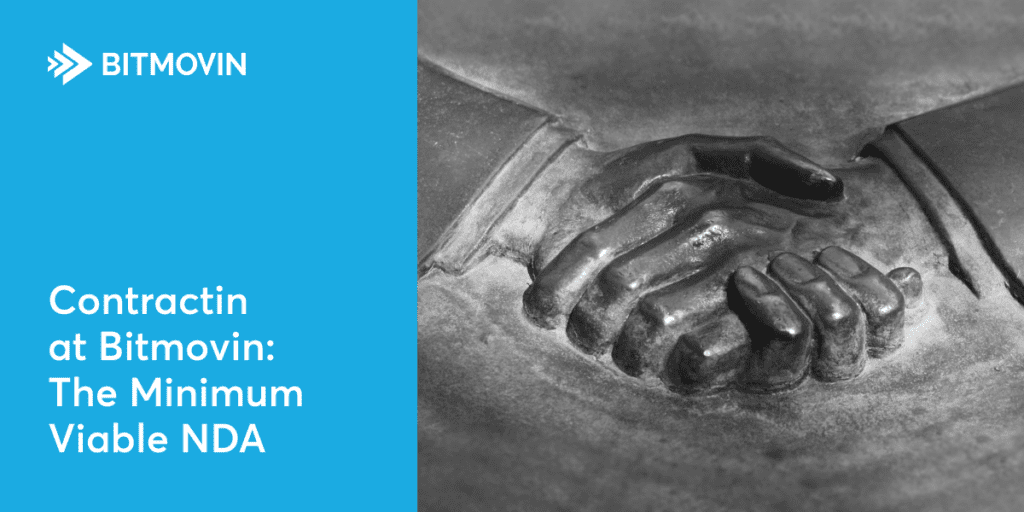
Bitmovin likes to move fast. Negotiating an NDA is not fast.
At Bitmovin, we believe fast is good; faster is better. It’s to be expected from a company which has developed technologies to provide 100x realtime video encoding. The same is true for us on the legal team. We are working to make sure that all of our contracting processes are as fast and easy for the customer as is possible. Beyond speed, we fundamentally believe that if we are making our customers spend time negotiating agreements with us, we are keeping them from enjoying our products and are not generating value for them.
In consequence, we consider negotiating non-disclosure agreements (NDAs) for routine sales and procurement a complete waste of time. Even if we are not negotiating the agreement, reviewing the NDA takes time. Instead, NDAs should be setup to speed the customer through the transaction as swiftly as possible. NDAs are, at their essence, a trust building exercise between the two companies.
Our philosophy on NDAs has always been not to negotiate them. Our preference is to use our routine MNDA since it is fair and standard. If the other party did not take ours or shot theirs first, we would sign it as long as their NDA does not have anything that would create any undue liability or unnecessary obligations. And besides, if the other side is going to negotiate an NDA, imagine how difficult that party is going to be when it is time to negotiate the definitive agreement.
How can we improve NDAs for everyone?
While NDAs might not seem like a very interesting area of the law, it is a subject that comes up quite frequently on a listserv I am on for tech GCs in San Francisco. The consensus on the list is that instead of instinctively exchanging an NDA, the business should consider whether it is actually going to share any confidential information and whether an NDA is needed in the first place. When reviewing the other party’s NDA most of us agree to look for clauses which are on our list of “no-no’s.” Some of this no-no’s are clauses like residual clauses or that confidential information must be marked confidential or “must be memorialized in a writing within 30 days” (seriously, when was the last time you did that?).
Given all this, I have been wondering if there is a better way. Specifically, would it be possible to get to a standard NDA that, while not appropriate for all use cases, would cover the vast majority or routine commercial transactions. Further, would there be a simple, reliable way to disclose to the other party what’s in the NDA without their having to read it word for word. What I have settled on is an idea for using a “Creative Commons Licensing” approach for NDAs. Creative Commons basically distills 309 years of copyright law into seven essential licenses. Each of the standard clauses in these licenses are represented by icons, so within a few seconds a party can come to understand the rights and obligations it is being granted.
The “Minimum Viable” NDA
So, I created what I am referring to as a minimum viable or universal NDA. I then attempted to represent our standard NDA in a Creative Common-type format.
| Clause | Description |
| Directionality | Mutual |
| Confidential Information | any technical or business information |
| Exceptions to Confidential Information | now or becomes generally known was known, without restriction rightfully acquired from a third party is independently developed without access to any Confidential Information. |
| Restrictions | Disclosure; non-use |
| Marking requirement | Marked, verbally designated, or reasonable person standard |
| Purpose | discussions regarding a business opportunity of mutual interest |
| Residuals | No |
| Injunctive relief | Yes |
| Term | 5 years; confidentiality obligations end |
| Law | California |
I welcome your feedback as to what’s viable, what’s not, and what’s missing.
In sum, Bitmovin is not seeking any unfair commercial or legal advantage by entering into an NDA. Rather, we are simply seeking to secure our corporate information and that of our customers and partners. If you commit that your NDA conforms to this standard or represent the clauses in this way, we can sign the NDA on sight and get you (and us) on to better uses of time.




